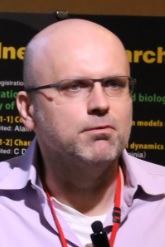

"How data assimilation helps to illuminate complex biology"
[ 2017年03月01日 ]
RIKEN International Symposium on Data Assimilation 2017
"How data assimilation helps to illuminate complex biology"
Mathematical models are often indispensable to understand, predict and control complex biological systems behaviour. Paradoxically, this complexity and the incompleteness of our knowledge is also the main obstacle for model development. Systematic model error and parameter uncertainty in combination with sparse and high dimensional data are characteristic challenges to modelling and data assimilation in the field of systems and quantitative biology. In this presentation we compare these problems to data assimilation challenges in the geosciences, where many sophisticated and highly efficient techniques have been developed.
We will also present a recent data assimilation method, the Dynamic Elastic Net (DEN) for the simultaneous estimation of model errors and systems states. We show for some example biochemical reaction systems that the DEN can often provide accurate state estimates even in the presence of systematic model errors. However, sometimes model errors can not uniquely be identified from output measurements. We present a computational strategy to explore and rank possible alternative explanations for discrepancies between experimental data and model predictions, which can be used to guide systematic experiments to resolve ambiguities. We will discuss some ideas to extend the DEN to very large network systems.
http://www.data-assimilation.riken.jp/risda2017/
※Flash動画に関しては、PC端末より閲覧頂くようお願い致します。
| 講師プロフィール |
 |
| 名前:Maik Kschischo | 所属:University of Applied Sciences Koblenz |
| 略歴:外部ページ |





